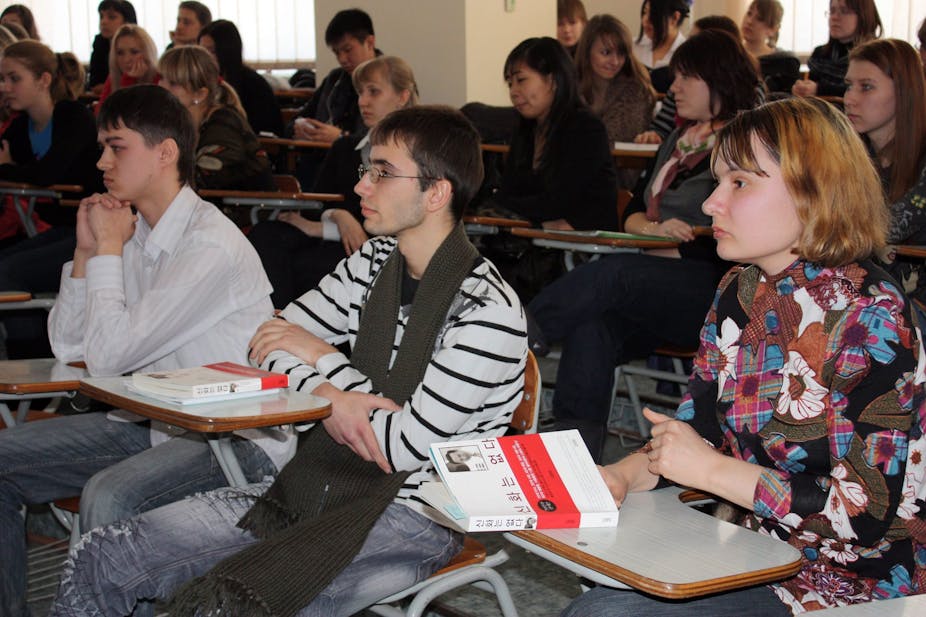Language experts have applauded Opposition Leader Tony Abbott’s pledge to dramatically boost foreign language education, but warn that a financial investment of about $2 billion and a long-term commitment to teacher training will be needed to achieve it.
In his response to the Federal Government’s budget, Mr Abbott vowed to increase the number of Year 12 students studying a language other than English to 40% within a decade. The commitment would return foreign language study to levels not seen since the 1960s.
Presently just 12.8% of Year 12 students take a foreign language. Of those, 5.8% are studying an Asian language.
Mr Abbott said he would also promote Asian languages from pre-school in a bid to improve the opportunities of Australians in the region: “We are supposed to be adapting to the Asian Century, yet Australians’ study of foreign languages, especially Asian languages, is in precipitous decline.”
Kathe Kirby, Executive Director of the Asialink and Asia Education Foundation at the University of Melbourne, described Mr Abbott’s commitment as a “fantastic initiative”, but warned that without substantial funding, Australia would not come close to realising it.
“I sat on the National Asian Languages and Studies in Schools Program (NALSSP) reference group for three years, and we did quite a lot of work on the figures that are needed,” Ms Kirby said. “Between 1995 and 2002, we doubled the number of students studying an Asian language in Australian schools. That cost $100 million a year in today’s terms, and by the end of it there were still only 6.6% of Year 12 kids taking an Asian language.
"Using that dollar amount, and extrapolating to Mr Abbott’s goal, which is much, much bigger, you’d be looking at close to $2 billion over the decade.”
That worked out at about $66 per student per year, Ms Kirby said.
Without a firm bipartisan commitment to a sustained plan, the target set by Mr Abbott would remain well out of reach, she said. “And if you can’t get the states to commit to this, too, because let us not forget that it’s the states that have responsibility for schooling and not the federal government, then once again, you won’t achieve it.
"People have said to me, ‘Isn’t this just a ludicrously aspirational target?’ And my response to that is that in most other developed countries in the world, 100% of students study a foreign language in Year 12. China, Japan, Korea, Taiwan, Singapore, Hong Kong - and then you’ve got the European countries. In Sweden, they do three. In the Netherlands, they do three. And so on. Australia has the lowest record in all OECD countries of second-language learning.”
Learning a foreign language was not just about communication, she said, but about understanding another culture. “In today’s inter-connected world, people need that skill and that understanding to increase their opportunities.”
Yuko Kinoshita, a Senior Lecturer in the Faculty of Communication and International Studies, said she welcomed Mr Abbott’s “commitment to foreign language education, as I believe it has a significant impact on the multicultural society like ours, well beyond getting an extra edge in the global market.
"His aspiration to have "40% of high school students learning another language” is absolutely achievable. In many countries, a foreign language - most often English - is mandatory at a high school, or even primary school level. Most of our Asian neighbours have English as a part of compulsory education.“
Dr Kinoshita agreed that the target could only be met with a long-term commitment from the both sides of politics. "We need more qualified teachers. It takes time to foster qualified teachers with great understanding of language and culture. We also need to work out the state and national level curriculum so that the students who started learning at preschool won’t be taught the same stuff over and over again throughout their primary and high school.
"If we would like to have any meaningful outcome, we have to think well beyond the time span of the federal election.”
Ms Kirby agreed that a major injection of funding for teaching training would be needed, but said that “increasingly technology can help out. Children can have Skype sessions with children in Jakarta or China. Technologies like Skype and interactive whiteboards and other platforms where kids can be coached by native speakers in another country - they are changing the face of learning. It means we don’t need to look at our current model of language teaching, and say, ‘Here’s how many teachers we have now, we need to double or triple that.’”

